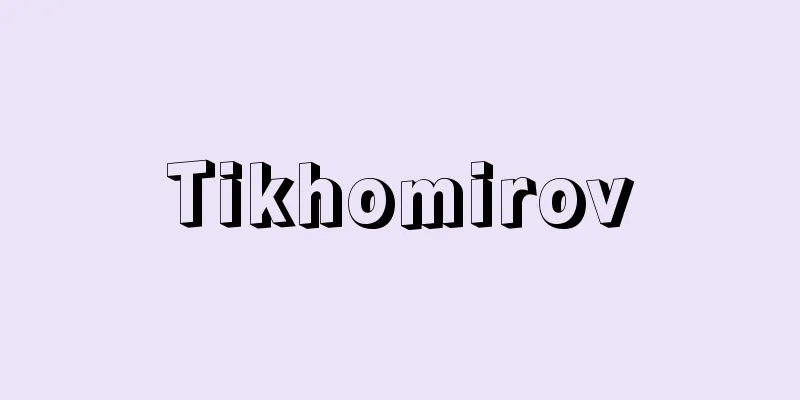Tikhomirov

|
A Russian revolutionary and a member of the Narodnik Party. After the assassination of Tsar Alexander II (1881), he changed his views in exile. He petitioned Tsar Alexander III, was pardoned, and returned to Russia. He took a right-wing stance as editor of the Moscow Correspondence from 1909 to 1913, but came into conflict with the autocratic rule again when he attacked Rasputin, and supported the revolutionaries during the February Revolution. Source : Heibonsha Encyclopedia About MyPedia Information |
|
ロシアの革命家,ナロードニキ。〈人民の意志〉党の理論家。皇帝アレクサンドル2世の暗殺(1881年)後亡命先で転向。皇帝アレクサンドル3世に嘆願書を出して赦免され帰国し,1909年から1913年の間《モスクワ通信》編集長として右翼的な論陣を張ったが,ラスプーチン攻撃で専制支配と再び対立,二月革命では革命派を支持した。
出典 株式会社平凡社百科事典マイペディアについて 情報 |
>>: Tikhonov, Nikolai Semënovich
Recommend
Sasa (bamboo grass)
A plant of the grass family with long woody culms....
Nezuppo - Nezuppo (English spelling) dragonet
A general term for marine fish of the family Ranu...
Chemical fiber
In contrast to natural fibers, these are fibers t...
Mourning clothes - Mofuku
Formal clothing worn to mourn the dead and expres...
Ishidaino
In the Edo period, taxes were paid in currency in...
r Selection - Art Song
…A species that has achieved such adaptation is c...
Tozaburo Ito - Tozaburo Ito
...Lyrics by Sakurada Jisuke II. Music by Kineya ...
Iona [island] - Aiona
…born in Donegal as a member of the royal family....
Sky View - Kuugan
〘Noun〙 A Buddhist term. The observation that all t...
Charkhā (English spelling)
It means a spinning wheel in Hindi. During the Ind...
Ganglion stimulant agent
...Natural alkaloids include atropine and scopola...
Acetoacetic acid - Sweat and Sakusan
It is an unstable liquid acid with a melting poin...
Tale of a Different Kind of Wife - Iruinyobotan
…The Dragon Palace is a reflection of the idea of...
Stereoscopic print - Rittaiinsatsu (English name) stereoscopic print
A printing method or printed matter that makes fl...
Expected value - Kitaichi
When the outcome of a probability phenomenon is e...









